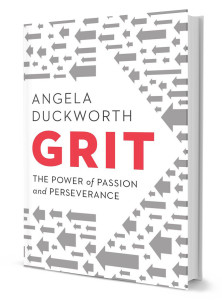The word GRIT has become a bit of a buzzword lately, but I think it’s such a great word to capture what we are hoping to develop in our kids…both my own kids and the kids that I have the privilege of investing in everyday. I really enjoyed GRIT by Angela Duckworth as a way to really dive into how to measure grit, how to assess grit, and how to inspire grit. This book is a great mix of research and anecdotal support helping the reader truly see the power of passion and perseverance. As a Christ follower, I’d take this one step further in the motivation section to point towards Colossians 3:23-24:
Whatever you do, work heartily, as for the Lord and not for men, knowing that from the Lord you will receive the inheritance as your reward. You are serving the Lord Christ.
I highlighted several things while reading and have posted those notes below…
- Who are the people at the very top of your field? What are they like? What do you think makes them special?
- In sum, no matter the domain, the highly successful ha da kind of ferocious determination that played out in two ways. First, these exemplars were unusually resilient and hardworking. Second, they knew in a very, very deep way what it was they wanted. They not only had determination, they had direction. It was this combination of passion and perseverance that made high achievers special. In a word, they had grit.
- Our potential is one thing. What we do with it is quite another.
- If talent falls short of explaining achievement, what’s missing?
- There are no shortcuts to excellence. Developing real expertise, figuring out really hard problems, it all takes time—longer than most people imagine. And then, you know, you’ve got to apply those skills and produce goods or services that are valuable to people. Rome wasn’t built in a day.
- Grit is about working on something you care about so much that you’re willing to stay loyal to it.
- Grit has two components: passion and perseverance.
- What I mean by passion is not just that you have something you care about. What I mean is that you care about that same ultimate goal in an abiding, loyal, steady way. You are not capricious. Each day, you wake up thinking of the questions you fell asleep thinking about. You are, in a sense, pointing in the same direction, ever eager to take even the smallest step forward than to take a step to the side, toward some other destination. At the extreme, one might call your focus obsessive. Most of your actions derive their significance from their allegiance to your ultimate concern, your life philosophy.
- The more unified, aligned, and coordinated our goal hierarchies, the better.
- At the start of an endeavor, we need encouragement and freedom to figure out what we enjoy. We need small wins. We need applause. Yes, we can handle a tincture of criticism and corrective feedback. Yes, we need to practice. But not too much and not too soon. Rush a beginning and you’ll bludgeon their budding interest. It’s very, very hard to get that back once you do.
- What do I like to think about? Where does my mind wander? What do I really care about? What matters most to me? How do I enjoy spending my time? And, in contrast, who do I find absolutely unbearable?
- Considering all the studies showing that gritty people typically stick with their commitments longer than others, it seemed like the major advantage of grit was, simply, more time on task.
- How you see your work is more important than your job title.
- You never know who will go on to do good or even great things or become the next great influencer in the world—so treat everyone like they are that person.
- “Children have never been very good at listening to their elders, but they have never failed to imitate them.” James Baldwin
- When does struggle lead to hope, and when does struggle lead to hopelessness?
- Kids thrive when they spend at least some part of their week doing hard things that interest them.
- If you want to be grittier, find a gritty culture and join it. If you’re a leader, and you want the people in your organization to be grittier, create a gritty culture.
- “It is not the critic who counts; not the man who points out how the strong man stumbles, or where the doer of deeds could have done them better. The credit belongs to the man who is actually in the arena, whose face is marred by dust and sweat and blood; who strives valiantly; who errs, who comes short again and again, because there is no effort without error and shortcoming; but who does actually strive to do the deeds; who knows great enthusiasms, the great devotions; who spends himself in a worthy cause; who at the best knows in the end the triumph of high achievement, and who at the worst, if he fails, at least fails while daring greatly, so that his place shall never be with those cold and timid souls who neither know victory nor defeat.” Teddy Roosevelt, “Citizenship in a Republic” (1910)
- To be gritty is to keep putting one foot in front of the other. To be gritty is to hold fast to an interesting and purposeful goal. To be gritty is to invest, day after week after year, in challenging practice. To be gritty is to fall down seven times, and rise eight.
Categories:


